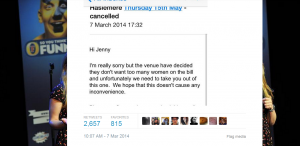Many people have been annoyed-to-furious with American Atheists and Dave Silverman over the past few days over their courtship of members of the batshit-rightwing community. AA was going to have a table at the Conservative Political Action Conference (CPAC), but then CPAC changed its mind and gave AA its money back. Dave went to the conference anyway, and talked to lots of people there.
Raw Story reported on some of those conversations on Friday.
[Silverman] seems an unlikely proselytizer for this suit-and-bow-tie crowd, tearing into his subject with the wired energy of an old-school punk rock fan. But he claims it’s working.
“I came with the message that Christianity and conservatism are not inextricably linked,” he told me, “and that social conservatives are holding down the real conservatives — social conservatism isn’t real conservatism, it’s actually big government, it’s theocracy. I’m talking about gay rights, right to die, abortion rights –”
Hold on, I said, I think the Right to Life guys who have a booth here, and have had every year since CPAC started, would disagree that they’re not real conservatives.
“I will admit there is a secular argument against abortion,” said Silverman. “You can’t deny that it’s there, and it’s maybe not as clean cut as school prayer, right to die, and gay marriage.”
That’s one of the items that people are riled about (apart from the basic issue of going there at all). It’s a bit tangled. At first Dave is saying that conservatism needn’t be social conservatism, because that’s actually big government and theocracy, and conservatism ought to be opposed to that – so conservatism should have no problem with gay rights, right to die, abortion rights. Then the reporter, Roy Edroso, says but there are anti-abortion people here, and they would say they are conservatives. Then Dave says there is a secular argument against abortion, so opposing abortion isn’t necessarily theocratic. So that could be a genuine conservative position, because it’s not theocratic, while school prayer, right to die, and gay marriage are issues to do with church and state.
Well, there are a lot of conservatives who are conservatives because they want the lowest possible taxes on themselves and no unions or minimum wage or national health; such conservatives may be socially liberal, or indifferent. But guess what: that doesn’t mean they’re interested in pulling away from the social conservatives. You know why? Because votes, that’s why. They can’t win by themselves, so they put up with a lot of bullshit that they don’t personally like, in order to win, in order to have lower taxes.
So Dave coming along and dangling atheism in front of them is not very likely to make them go anywhere. And meanwhile it’s pissing off his supporters in the other direction, so it might not be such a hot idea.
Then he expands on his own political views.
But why is this his battle? Why not let conservatives be conservatives and just vote for the candidates he likes? “Because I want a choice,” said Silverman. “I don’t get a choice at the voting booth, ever.” He describes himself as a “fiscally conservative” voter who “owns several guns. I’m a strong supporter of the military. I think fiscal responsibility is very important. I see that as pretty conservative. And I have my serious suspicions about Obama. I don’t like that he’s spying on us. I don’t like we’ve got drones killing people…” In the final analysis, “the Democrats are too liberal for me,” he says.
See I can’t make sense of that part at all. Those suspicions of Obama aren’t right-wing suspicions, they’re left-wing suspicions. The right wing is all for spying on us (does the name George Bush ring a bell?) and it thinks drones are the best fun ever. The Democrats aren’t too liberal for Dave, at least not on the issues he listed there; they’re too conservative for him.
Secular Census points out that the numbers don’t support this move anyway – they really don’t support it. There are so few Republicans on Team Atheism it’s a joke.
There are several survey questions; let me show you just one:
For which presidential candidate did you vote in 2012? [Question visible only to those who've indicated they voted.]
- 82.5% Barack Obama
- 06.2% Jill Stein
- 03.1% Gary Johnson
- 00.9% Mitt Romney
[remainder were other / can't remember / etc.]
See what I mean? Does it seem worth pissing off that 88% for the hope of attracting some of the .9%? That’s POINT nine percent. Does it?
I would say no.
Historically, secular identity organizations have gone to some trouble to accommodate their conservative minorities, taking care not to alienate Republican and/or libertarian members with positions too far to the left on issues (like reproductive rights) that might be seen as “non-core.” One of our motivations for creating the American Secular Census was, in fact, to try to quantify the prevalence of conservatism among Secular Americans, since we have suspected for some time that it is less than believed by organizations’ leaders, boards, and staff. So far, our statistics have borne out this theory. So why are groups continuing to accommodate — and now actively courting — conservatives into the secular movement, especially at a time when organizations’ support for, and relevance to, women is being debated?
Maybe secular leaders aren’t aware of these political statistics …? Except that they are. These very figures were posted by us on a listserv of leader-subscribers of these two and many other organizations in July of 2013, following a claim by one leader that 30% of secular voters are Republican. We asked for a citation on that figure, were never given a primary source for it, and then posted these figures as clarification for our request. There was no followup to our post.
That one leader was Edwina Rogers of SCA.
So, yeah. Many of us have been getting increasingly alienated from the atheist and secularist movements because they seem to have shitty politics on a lot of issues. The Secular Census post shows us that they’re not even making a good cynical move.
(This is a syndicated post. Read the original at FreeThoughtBlogs.)


